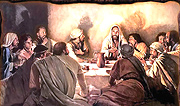One of the many things which used to shock Jesus in his earthly ministry is the way his disciples failed to grasp his divine reality because they were blinded by their human logic. Even Peter himself who had made a beautiful profession of faith in Christ, when Jesus pointed out that he would go to Jerusalem where he would meet his death; Peter protested and even vowed to fight to death in defence of Jesus.


One of the many things which used to shock Jesus in his earthly ministry is the way his disciples failed to grasp his divine reality because they were blinded by their human logic.
Even Peter himself who had made a beautiful profession of faith in Christ, when Jesus pointed out that he would go to Jerusalem where he would meet his death; Peter protested and even vowed to fight to death in defence of Jesus.
Like the rest of the Jews, Peter thought that the Messiah would be a great political king who would fight the enemy of Israel. He even went as far as taking Jesus aside and begged him to stick to the teaching of the rabbis.
The rabbis thought that the Messiah would never die and would begin an era of happiness without end for the Israelites. It was so hard for them to see how anything contrary to their wish would be taken as the plan of God.
Jesus, who had a mission to accomplish according to the will of his Father, corrected the peoples’ erroneous views of him, since he did not like anybody to follow him for the wrong reasons.
He explained to them further what his mission was about: He was going up to Jerusalem not to engage the enemies or to take power, but to give his life as a sacrifice of atonement for the sins of people.
Peter whom Jesus had called earlier a living rock of his Church, because he had accepted his plan of salvation, was called a stone that had become an obstacle, when he refused to understand the mission of Christ.
It is amazing to think how the Jews continued to stumble over the fact that the Messiah would die first in order to fulfil his mission, yet this was the point which was spoken by all the prophets of Israel.
They made the most common human mistake of over dwelling on what they wanted to hear; the promise of victory, without even paying attention to the kind of victory which the prophets were talking about.
It is this wish that they wanted to make a horse on which Jesus would ride up to Jerusalem; and there be installed as their King.
They missed the point. Deep down, we often times appreciate Jesus in our life as the one who led the wonderful exemplary life.
He becomes our hero. We over dwell on this kind of admiration and perhaps overlook the fact that it is for our sake that he had to die on the cross.
Since Adam, our first parent, sinned and was condemned to death with all his posterity–in order for him and us to be freed, someone had to die in his place.
Jesus satisfied those claims of justice. It is precisely the price paid for our freedom that we do not meditate on enough as individual Christians or collectively as a community of believers.
Today, the message is still clear and relevant to our situation; If anyone wants to go with Jesus, he or she must do it not only because of his or her personal ambition and selfishness but with the love of God and of humanity in the first place.
By the second condition Jesus did not mean that the disciples were asked to bear patiently the cross of their lives individually. It meant something bigger than that: to follow the same path that Jesus took.
It required them to try to live his ideals, and remain faithful to the Gospel even when it required being persecuted for its sake. We are given reasons why these conditions are necessary.
First, those who sacrifice their life do not in fact lose it. They find it, the way a farmer loses his seeds by sowing it in his field in order to recover a hundredfold during the harvest.
Today, as we meditate on these words of Jesus, we may find that he could not make it any clearer to us. That is why he concluded with these words: "He who has ears to hear, let him hear!”
According to him, being a Christian would, out of necessity, require both courage and heroism on our part. He makes it abundantly clear that we cannot talk of Christianity, without self-denial and bearing with the cross of each individual Christian.
In fact it takes an act of courage to read and meditate on those words and an even greater act of personal heroism to try to fulfil them in our life. It takes courage to call ourselves Christians and try to live up to it. Then we accept that we are sinners in need of pardon.
Contact: casmir1958@yahoo.com


